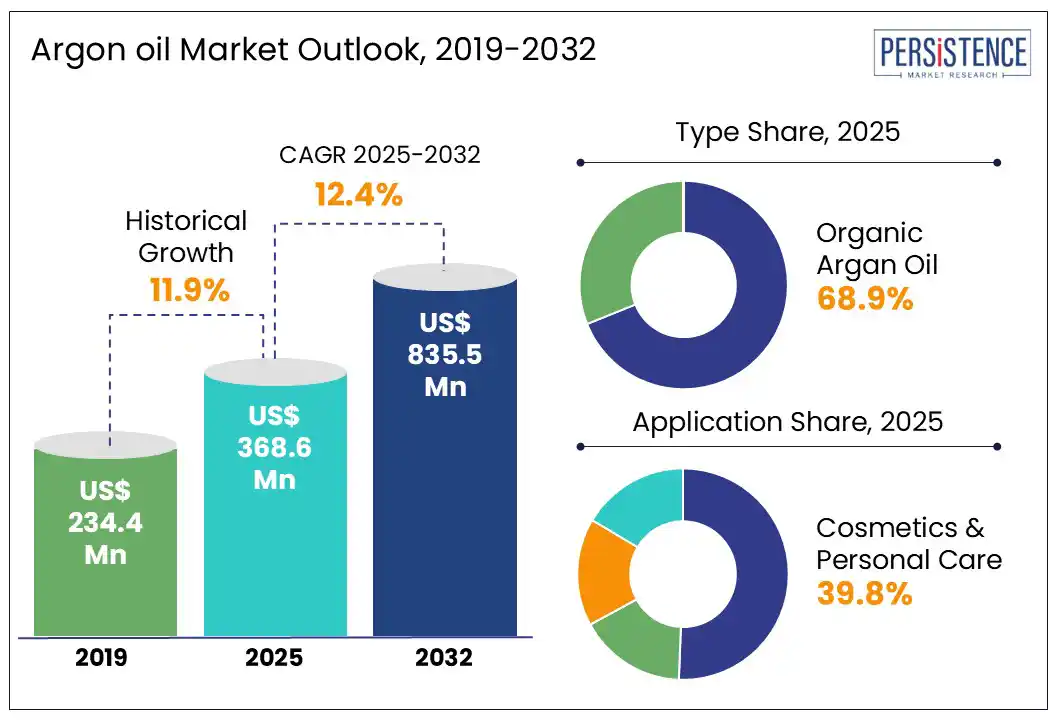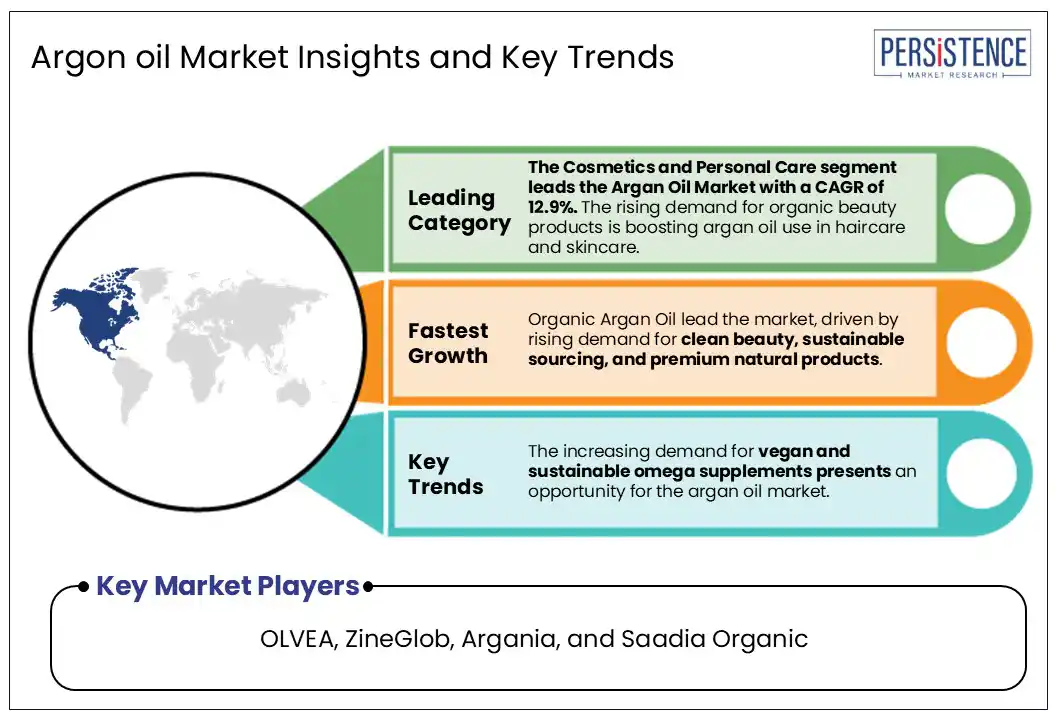ID: PMRREP35476| 195 Pages | 9 Jul 2025 | Format: PDF, Excel, PPT* | Consumer Goods

The global argan oil market size is likely to be valued at US$ 368.6 Mn in 2025 and is expected to grow at US$ 835.5 Mn in 2032 with a staggering CAGR of 12.4% during the forecast period from 2025 to 2032.
The argan oil market is experiencing substantial growth, fueled by rising demand across various industries, including cosmetics, food, and pharmaceuticals. The increase in imports highlights the growing global interest in Argan Oil, which is renowned for its numerous health and beauty benefits. As these industries continue to adopt its versatile uses, the argan oil trade is expected to strengthen, creating new opportunities for producers and exporters worldwide.

Key Industry Highlights:
|
Global Market Attribute |
Key Insights |
|
Argan Oil Market Size (2025E) |
US$ 368.6 Mn |
|
Market Value Forecast (2032F) |
US$ 835.5 Mn |
|
Projected Growth (CAGR 2025 to 2032) |
12.4% |
|
Historical Market Growth (CAGR 2019 to 2024) |
11.9% |
The growing skincare and haircare industry significantly drives the argan oil market, as consumers increasingly look for natural, multi-functional ingredients. Argan oil is highly valued for its hydrating, anti-aging, and anti-frizz properties, making it an essential component in moisturizers, serums, shampoos, and conditioners. Its rich content of essential fatty acids, antioxidants, and vitamin E contributes to skin nourishment, wrinkle reduction, and hair strengthening, thereby increasing its demand in premium beauty formulations.
Additionally, the rise of clean beauty trends and the consumer preference for organic and chemical-free products further enhance the popularity of argan oil, broadening its market presence worldwide. In March 2025, Josie Maran's well-known Whipped Argan Oil Body Butter introduced a new Golden Hour scent, showcasing the ongoing trend of incorporating argan oil into skincare products.
The argan oil market faces significant challenges due to its limited geographic availability, as argan trees are primarily found in Morocco's Argan Biosphere Reserve. Argan oil is extracted from argan fruits, which are a seasonal fruit. In a season argan tree produces about 30 kilos of argan fruits, which is equivalent to just one litre of argan oil. This reliance on a single country makes the market vulnerable to climate change, including droughts and desertification, which can negatively impact oil production. Political instability and trade restrictions within Morocco may disrupt the supply chain and lead to price volatility. Additionally, limited cultivation outside of Morocco restricts scalability, resulting in supply shortages, high costs, and sustainability concerns.
In 2022, Morocco experienced a severe drought that caused a 30% drop in argan fruit production, significantly affecting the supply of argan oil. As a result, global prices rose by over 20%, impacting manufacturers in both the cosmetic and food sectors. Water restrictions imposed by the Moroccan government further limited agricultural activities in argan-growing regions, highlighting the challenges posed by climate change and the market's geographic dependency.
The increasing demand for vegan and sustainable omega supplements presents an opportunity for the argan oil market. Rich in omega-6 and omega-9 fatty acids, argan oil offers a plant-based alternative to fish oil for vegans and vegetarians. Manufacturers can create argan oil-based dietary supplements in soft gel or capsule form, promoting benefits for heart health, brain function, and skin nourishment. Incorporating argan oil into functional foods like fortified beverages and nutrition bars can attract health-conscious consumers seeking clean-label, sustainable options.
Algae-based omega-3 supplements, like those from Ovega-3 and Nested Naturals, have emerged as sustainable alternatives to fish oil, appealing to health-conscious consumers. Similarly, argan oil, rich in omega-6 and omega-9, has potential in this market. Companies could create argan oil capsules or fortified nutrition bars, similar to Nutiva and Garden of Life. By emphasizing its benefits for heart, brain, and skin health, argan oil can establish itself as a premium vegan omega supplement.
The cosmetics & personal care segment is leading the market due to consumer awareness in natural and effective beauty products
In 2024, the cosmetics and personal care segment continues to dominate the Argan Oil Market with a significant CAGR of 12.9% by 2032. The increasing demand for organic and natural beauty products is driving extensive use of argan oil in haircare (such as shampoos, conditioners, and serums) and skincare (including moisturizers, anti-aging creams, and body oils). As clean beauty trends rise, major brands are incorporating pure and blended argan oil into their premium formulations. Growth is strongest in North America and Europe, but the Asia Pacific region, particularly South Korea, China, and India, is experiencing rapid expansion due to rising disposable incomes.
In 2024, Organic Argan Oil led the market, driven by rising demand for clean beauty, sustainable sourcing, and premium natural products. Consumers prefer chemical-free, cold-pressed formulations rich in Vitamin E and antioxidants, making it a key ingredient in luxury skincare, haircare, and functional foods. Stringent organic certifications (USDA, ECOCERT) boost trust, while ethical and fair-trade sourcing enhances appeal. The food & beverage sector favors organic variants for nutritional benefits.
L'Oréal, a global beauty leader, incorporates organic argan oil into its Garnier Whole Blends and L'Oréal Paris Extraordinary Oil haircare lines, emphasizing its nourishing and sulfate-free benefits. Similarly, Josie Maran Cosmetics, a luxury beauty brand, exclusively uses 100% organic, cold-pressed argan oil in its signature Argan Oil Face Moisturizer and Argan Enlightenment Illuminizer, catering to clean beauty consumers.
Both brands prioritize sustainable sourcing and hold ECOCERT certification, reflecting the increasing consumer preference for organic argan oil over conventional alternatives. This trend highlights why organic argan oil is leading the market in both the cosmetics and personal care industries.

The Asia Pacific region is experiencing a significant increase in demand for Argan oil, primarily due to its extensive use in the cosmetics and personal care industry. Key markets such as China, Japan, South Korea, and India are driving this demand, fueled by a growing preference for natural and organic beauty products. The popularity of K-beauty (Korean skincare) and J-beauty (Japanese skincare) has heightened interest in plant-based, nourishing ingredients like Argan oil, which is renowned for its moisturizing, anti-aging, and hair-strengthening benefits. As consumer awareness of chemical-free and sustainable beauty products rises, global brands are introducing Argan oil-based serums, hair treatments, and anti-aging creams, which further drive market growth.
Korean skincare has experienced a revival driven by social media trends and a growing interest in ingredient-focused products. Brands like Anua, Biodance, and Skin1004 have gained popularity, leading retailers to expand their K-beauty offerings. This resurgence emphasizes the importance of natural ingredients, such as Argan oil, to meet consumer demand for effective skincare solutions.
European consumers are increasingly valuing ethical sourcing and sustainability, making fair-trade certified Argan oil highly sought after. Moroccan cooperatives have received certifications from organizations such as ECOCERT and Fair Trade International, which ensure ethical labor practices and environmental sustainability. This guarantees fair wages for the Berber women who harvest and process Argan oil, promoting social empowerment and economic growth. As consumers prioritize transparency and sustainability in their choices, certified Argan oil is becoming more popular in Europe.
One notable cooperative is Coopérative Targanine, a Moroccan women-led organization that supplies fair-trade certified Argan oil to European markets. By complying with ECOCERT and Fair for Life standards, it ensures ethical wages and sustainable practices. Major brands such as L'Oréal and The Body Shop source Argan oil from these cooperatives, promoting social empowerment for Berber women while delivering high-quality oil. The growing demand for ethically sourced Argan oil is strengthening Europe’s position in the sustainable beauty and food market.
The North American argan oil market is experiencing a significant increase in demand, primarily due to its widespread use in the cosmetics and personal care industry. Consumers are increasingly attracted to natural and organic ingredients, driven by a growing awareness of the benefits of skincare and haircare. Argan oil, which is rich in antioxidants, essential fatty acids, and vitamin E, is highly regarded for its moisturizing, anti-aging, and nourishing properties. Additionally, the increasing use of argan oil in hair serums, facial oils, and body lotions is enhancing its presence in the market.
In 2024, Josie Maran Cosmetics launched a new variant of their Whipped Argan Oil Body Butter, featuring the 'Golden Hour' scent. This release illustrates the growing demand for argan oil in North America's cosmetics and personal care industry. The product takes advantage of argan oil's well-known moisturizing and nourishing properties, aligning with consumer preferences for natural and effective skincare solutions.
The global argan oil market is highly competitive, with a mix of global brands, regional producers, and cooperatives driving the industry. Moroccan cooperatives play a crucial role in supplying raw and organic-certified argan oil, benefiting from government support and fair-trade initiatives. Private-label brands and direct-to-consumer e-commerce models are also gaining traction. Sustainability and ethical sourcing remain key differentiators, with companies investing in traceability and eco-friendly packaging.
Price competition is significant, as synthetic alternatives and adulterated versions challenge pure argan oil’s premium pricing. Emerging markets, particularly in Asia Pacific, are fostering new entrants. Technological advancements in extraction and formulation will further shape the competitive landscape, making innovation and brand positioning critical for sustained market dominance.
The Argan Oil market is estimated to be valued at US$ 726.6 Mn in 2025.
Adoption of argan oil in the skin & hair care industry boosts the demand of the market is the key demand driver for the Argan Oil market.
In 2025, the North America region dominates the market with ~31.6% share in the global Argan Oil market.
Among application, preference for Cosmetics & Personal Care segment is expected to grow rapidly at 12.9% CAGR from 2025-2032.
OLVEA, ZineGlob, Argania, and Saadia Organic are the leading players in the Argan Oil market.
|
Report Attribute |
Details |
|
Historical Data/Actuals |
2019 - 2024 |
|
Forecast Period |
2025 - 2032 |
|
Market Analysis Units |
Value: US$ Mn, Volume: Tonnes |
|
Geographical Coverage |
|
|
Segmental Coverage |
|
|
Competitive Analysis |
|
|
Report Highlights |
|
|
Customization and Pricing |
Available upon request |
By Oil type
By Grade
By Application
By Distribution Channel
By Region
Delivery Timelines
For more information on this report and its delivery timelines please get in touch with our sales team.
About Author